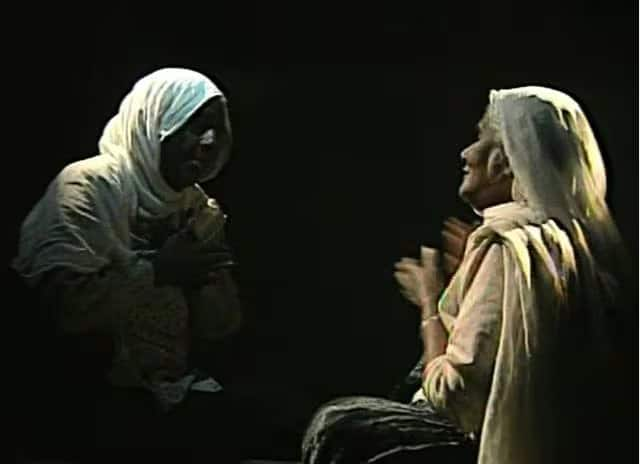
Now that Imtiaz Ali has introduced the rest of India (outside of Punjab) to the slain Punjabi Dalit folk singer Amar Singh Chamkila, known for his bawdy lyrics and his murder which is still shrouded in mystery, with his Diljit Dosanjh and Parineeti Chopra-starrer Netflix film, Amar Singh Chamkila, it is a good time to learn more about Punjab’s many folk music forms, styles and artists.
Decades before Chamkila and, lately, Badshah, became par for the course at Punjabi weddings, the melodic popular traditional folk songs like mehendi ni mehendi or phullan di bahaar occupied a pride of place. The singers of these songs were the Mirasans, or women singers of the Mirasi community. Shikha Jhingan’s documentary Mirasans of Punjab: Born to Sing will be screened in Delhi on Sunday.
Who were the Mirasis?
The Mirasi community members were among those Muslims who decided to stay back during the Partition. The Mirasis trace their lineage to Bhai Mardana, who was a Muslim. Bhai Mardana was the first disciple and also a long-time companion of Guru Nanak Dev. This community is found in north India (including Punjab, Rajasthan, Kashmir) and Pakistan. They are folklore tellers and traditional singers and dancers.
The Mirasi women were an important part of the cultural landscape of the region, where they derived power and prestige from their royal patrons. However, the women who were once sought-after for their rich repertoire of folk songs, saw a decline in their fortunes after the patrons fell on hard times. The community, which includes sub-genres like Naqqals and Bhands and comprising Awadhi folk singers, is slowly bowing out into extinction.
Why watch ‘Born to Sing’?
Shikha Jhingan’s reflective 40-minute documentary Mirasans of Punjab: Born to Sing on the lives of women singers of Patiala’s Mirasi community not only is insightful of the community's condition in the present, it takes us on a cultural journey of the pre-Partition times. The film follows four of the Muslim women singers in Punjab’s Malwa region, who would sing and perform at such life events as birth celebrations, weddings rituals, and mourning gatherings.
 Mirasi women in a still from Shikha Jhingan's documentary 'Born to Sing'.
Mirasi women in a still from Shikha Jhingan's documentary 'Born to Sing'.
The film will be screened in Delhi, on Sunday, April 21, at 7 pm at India Habitat Centre, following which the film will be available to stream online freely for this month. The director, an associate professor at department of cinema studies at Jawaharlal Nehru University (JNU) and founder member of independent women’s filmmaking collective Media-storm, will be present for a Q&A session. The screening is programmed by Kriti Film Club, an initiative of the non-profit KRITI. The Delhi-headquartered film club turns 25 years old on June 1.
What else to watch?
Besides this, the film club’s monthly online screenings, April Reels is showing seven films, all with English subtitles, till April 30 on doculive.blogspot.com.
Pankaj Rishi Kumar’s Pather Chaujaeri (Hindi/English, 2001) & Janani’s Juliet (Tamil/English, 2019). They look at art and its torchbearers trying to survive in hostile times, whether through the satirical folk theatre form of ‘Bhand Pather’ in Kashmir or how, in the latter film, a Pondicherry-based theatre group, Indianostrum, introspects caste, class and gender by spotlighting the rise in honour killings. Caste takes centre stage in Amudhan RP’s My Caste (Tamil, 2019). Tamil commercial cinema has consistently been spotlighting caste issues in its cinema, thanks to such makers as Vetrimaaran and Pa Ranjith. My Caste is the second in Amudhan’s trilogy on hegemony and consensus.
In Naach Bhikhari Naach (Bhojpuri, 2018), Jainendra Dost and Shilpi Gulati spotlight 'Launda Naach', the traditional folk theatre from Bihar, where male artists often cross-dress as women and perform on stage all night. The film follows four old-age artists who recreate the legendary artist Bhikhari Thakur, who’s also known as the Shakespeare of Bhojpuri.
Nirmal Chander’s Moti Bagh (Hindi, 2019), produced by Public Service Broadcasting Trust (PSBT), is a documentary about a farmer, whose story is emblematic of Uttarakhand’s ‘ghost villages’. Moti Bagh is as much a social story as it is a personal one, an intimate look at the many problems that plague rural Uttarakhand. Central to the story is the issue of palayan (mass migration), as observed and experienced by Chander’s farmer-uncle Vidyadutt Sharma, 83, in Sangaura village in Pauri Garhwal.
Both Janani’s Juliet and Moti Bagh had won the best long documentary award at the “Oscar qualifying” International Documentary and Short Film Festival of Kerala (IDSFFK), which ensured the films’ entry into the 92nd Academy Awards in 2020.
Farmers are also the subject of Shobhit Jain’s Hailstorm (Nimadi/Hindi, 2021). It is about a freak hailstorm which sets off a series of events in the life of farmers, bringing to light the vulnerability and precarious situation of those on the margins.
Vivek Sangwan’s Churning The Earth (multiple Indian languages, 2024) will be streamed on World Earth Day, April 22.
Discover the latest Business News, Sensex, and Nifty updates. Obtain Personal Finance insights, tax queries, and expert opinions on Moneycontrol or download the Moneycontrol App to stay updated!